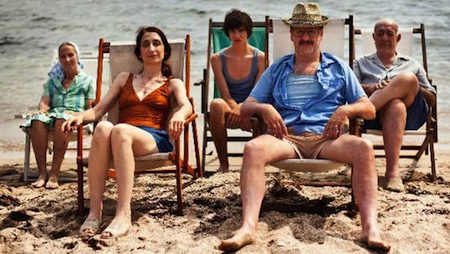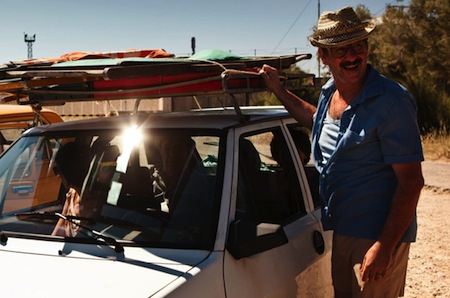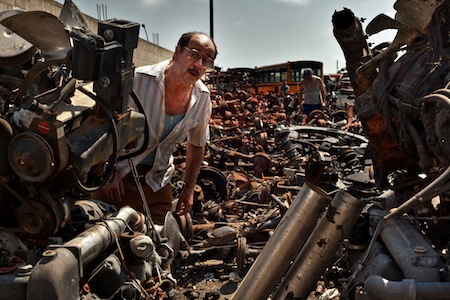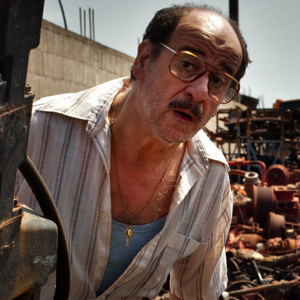It Was The Son TIFF Review & Interview
Tears and laughter. Violence and love. Blood in the sun.
‘It Was The Son’ (E’Stato Il Figlio) formerly ’The Son Did It’ is an amazing character driven story presented as a black comedy and set in Palermo, Sicily. It follows the struggles of a lower class Sicilian family trying to cope with the tragic death of their daughter. It is told from the view of an omniscient onlooker. The tragic situation suddenly changes for this family when they discover they can seize an opportunity to acquire a large sum of money as compensation for their loss from the government. This is cinematographer Daniele Cipri’s (Dormant Beauty) directorial debut and he has chosen to focus his lens on his native Sicily with masterful effect. ‘It Was The Son’ stars Toni Servillo, Giselda Volodi, Alfredo Castro and Fabrizio Falco.
‘The Son Did It’ (E’Stato Il Figlio) may have a story that is difficult to fully appreciate at first, at least for non-Italian viewers such as myself as it is a story deeply steeped in Sicilian folklore. It comments on an aspect of southern Sicilian lifestyle, the mafia culture and the special mentality that is part of this island reality. But Daniele Cipri has used an incredible sense of humor and irony to tell a story that is thoroughly captivating. I can’t remember the audience and myself, laughing so hard as we did at some of the scenes in the film. Intelligent and tasteful jokes make this film very special. Setting the story against the dark and violent atmosphere of project housing in Palermo created a grotesque, fantastical vision that is both immersive and compelling.
The main character Busu (Alfredo Castro) is a complicated person, struggling with terrible memories that we are about to discover. The narrator takes us back in time through one of the most unusual stories. The father character Nicola (Toni Servillo) is not a typical character but nobody really is in the film. I found his character especially interesting. He tries to maintain the face of a strong family leader but often fails, ending up as the biggest ‘comedian’ of all. I thought that the performance by Toni Servillo (‘Il Divo’, ‘A Quiet Life’, ‘The Girl By The Lake’) was fresh but also distinguished, allowing the viewer to laugh at him but still like him and treat him with some respect.
Visually the film is stunning. The colors are vivid and constantly remind you of the hot Sicilian landscapes and weather. Put together with amazing music by Carlo Crivelli, Daniele Cipri has created a very stylized, European sensibility for this tale that brings to mind films like ‘Amelie’ or ‘Delicatessen’.
MyETVmedia had the good fortune to catch up with Daniele Cipri while he was in Toronto for TIFF. We took the opportunity to talk to him experiences making about his directorial debut film ‘It Was The Son’ (E’Stato Il Figlio).
-Mat Kolodziejski
Translated Interview with Director Daniele Cipri at TIFF
Interview with Daniele Cipri about his mafia thriller, a tragedy/comedy based on the novel by Roberto Alajmo, set in Palermo, Sicily. It was premiered at the 69th Venice FF and TIFF 2012. myETVmedia caught up with director Daniele Cipri in Toronto, Canada right after the Venice premiere of The Son Did It (It Was The Son) Yes there was a slight change in the title to reduce search confusion. The cinematography is stunning and character development remarkable.
Tell us about ‘It Was the Son’
Well it’s a story taken from a book by a writer from Palermo named Robert Alejmo.
But in a way it’s more of a universal story. It’s very much about family.. and the family is from Palermo, but in my take of things it’s really more about an Italian family in general.
Where did you get you’re inspiration for the film?
Of course I read the book and thought it was an extremely powerful story but I didn’t know how I would film it or if I even wanted to make the film. The defining moment came when I was in the post office, waiting in line, as you do in Italian post offices for a long time. I was looking at the numbers, slowly counting down and I saw this old man, who was there for the longest time. He was a storyteller and he told a lot of stories about his personal life, his family, all sorts of things but always to different people. People kept changing, moving out and moving on and he was always there talking. And I understood after a while he was someone who was doing odd jobs for other people. He was waiting in line to pay bills for others and so he was there basically all day telling these stories in a very fragmented interesting manner and I thought that related in a very interesting way to how you tell stories in Cinema, or rather how you can tell stories in Cinema. And so I took that as the binding thread for my film, which is pretty much the same situation: A guy in a post office who starts telling this weird story about the Ciraulo family.
Did you always have Tony Servillo in mind to act in this film?
No. Tony actually came later. In the beginning I was trying to create a painting almost rather than a film. So I had an image for the actors too, but not necessarily names or actual people. The one thing I knew was that I didn’t want a Sicilian to play this because to me it’s more of a universal story. But of course it had to be a great actor who was able to work within the Sicilian context, and someone who reminded me of some of my relatives, just to make it more real in that sense. Tony was just perfect for the role and fortunately he took an interest relatively early on and we just clicked. It seems to me he had a really good time doing this film
What was your favorite moment of the film?
Well some people always tell me that I am really Busu the main character, the son of the title. So the final scene is probably what interests me most and what excited me most about the film. Tony Servillo also asked me, “well how can we get this change to register from the protest that goes on before to this final very dramatic scene in which basically a life gets destroyed”. I told him not to worry about it too much because we would figure it out and we did, thanks to the actors, but this development in this specific scene was something I really liked.
What would you like audiences to get out of your film?
I hope that audiences will come to their own conclusions, but I hope it’s an image, or a mirror of contemporary Italian family life. The difficulties that many people, especially in Italy, have of wanting to appear to be someone they aren’t, the tragedy of riches so to speak. That is definitely something that is very prevalent in Italy and was one of the strongest reactions I received from Italian audiences so far. But the general message is more universal in the sense that I think people should take away from this film that you can laugh at dramatic developments, you can laugh at tragedies. Originally I didn’t even want to do this film because the story seems so dire, so dramatic, so hopeless, but even that can be shown in a way that provokes a smile. That is something that’s important everywhere I believe, so if people take that away I’d be really happy.








